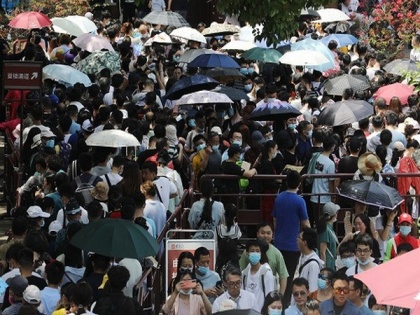China approaching demographic crisis: report
By ANI | Published: May 17, 2021 11:15 PM2021-05-17T23:15:19+5:302021-05-17T23:25:08+5:30
Even after postponing the results of the once-in-a-decade census for a month, the Chinese government was unable to fully cover up the alarming demographic situation that the country is facing.

China approaching demographic crisis: report
Even after postponing the results of the once-in-a-decade census for a month, the Chinese government was unable to fully cover up the alarming demographic situation that the country is facing.
According to the seventh nationwide census of 2020, China's population has grown by merely 5.38 percent over the last 10 years. China's birthrate has been on the decline since 2017, despite easing of the 'one-child policy' in order to avert an incoming demographic crisis.
Jianli Yang, president of Citizen Power Initiatives for China wrote in American news magazine Newsweek that although there is no established standard for how large a population any given country needs, having more young people than elderly people is beneficial for a country's long-term development.
In the footsteps of developed countries, China has already entered a stage of "moderate aging" and its birthrate is now insufficient to make up for the aging population. Yang argues that the problem is that this aging population has yet to acquire adequate wealth.
"China's GDP per capita has just reached USD 10,000. Not only does this place China far behind developed countries, but it also means that China lags behind some countries with younger populations. Consequently, in recent years, more and more people in the country have called for the government to fully lift birth restrictions," he said.
Yang further said the Chinese government did not fully allow citizens to have a second child until 2016. "Before 2016, a strict one-child policy had been implemented for nearly 40 years. While it is unclear whether the one-child policy advanced the CCP's goals for China's economic and social development, there is no doubt that its strict implementation resulted in innumerable human rights violations and humanitarian tragedies," he added.
Moreover, the census also revealed that the country has about 30 million unmarried men, which is more than the entire population of some countries.
China has maintained a long-standing preference for male babies and despite the latest census suggesting a slight increase in the number of girls being born, experts say that the gender gap issue is unlikely to be resolved soon, South China Morning Post (SCMP) reported.
According to China's seventh national population census, out of the 12 million babies born last year there were 111.3 boys for every 100 girls. In 2010, the ratio was 118.1 to 100.
"Normally in China, men marry women who are much younger than they are, but as the population ages, there are even more older men, which exaggerates the situation," said Stuart Gieten-Basten, a professor, underscoring the prevailing desire to have sons rather than daughters in Chinese families.
Bjourn Alpermann, another professor, warned of a huge shortfall in potential brides by the time the babies born reached marriageable age. "Of these 12 million babies that were born last year, 600,000 boys will not be able to find a marriage partner their same age when they grow up," he said.
China's one-child policy, implemented in 1979 and withdrawn in 2016, had exacerbated the practice of sex-selective abortion in favour of boys, said Jiang Quanbao, a demography professor.
( With inputs from ANI )
Disclaimer: This post has been auto-published from an agency feed without any modifications to the text and has not been reviewed by an editor
Open in app